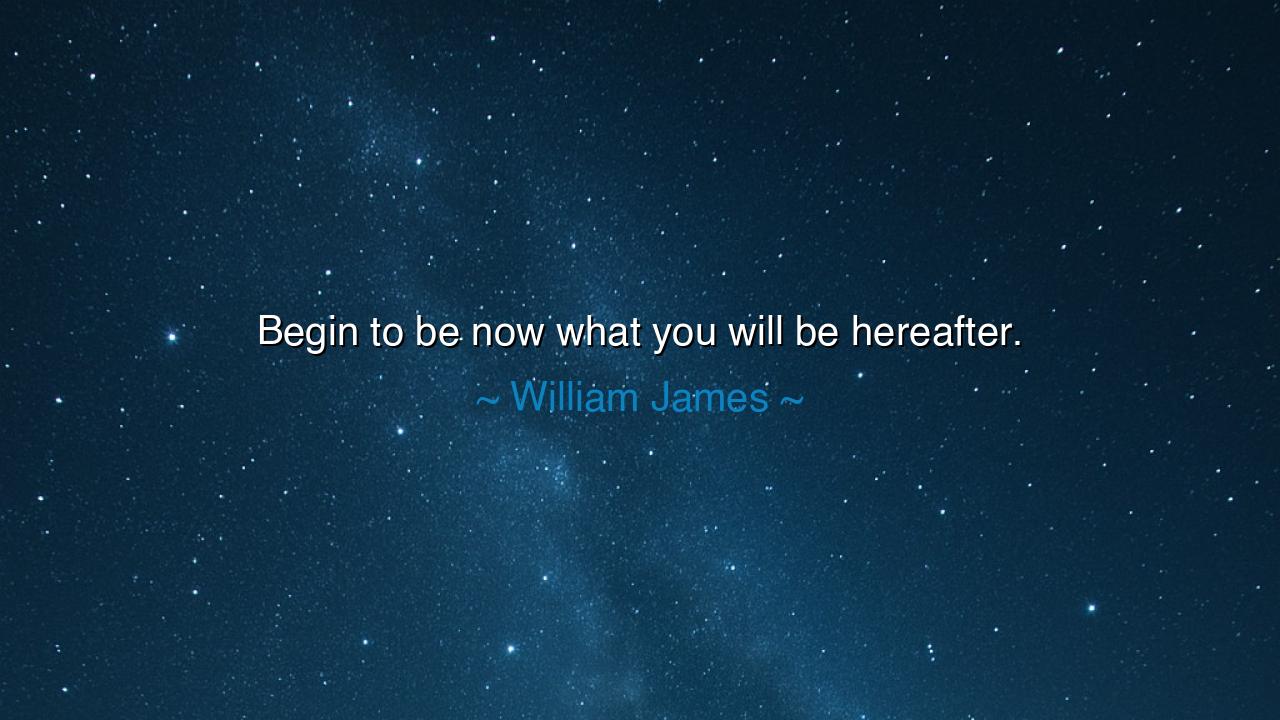
Begin to be now what you will be hereafter.






In the wisdom of William James, father of modern psychology and philosopher of the will, we are given a command that cuts through hesitation like a blade: “Begin to be now what you will be hereafter.” These words, though simple, are mighty. They declare that the future is not a distant dream, waiting passively to unfold. The future is forged in the present, born from the choices we make today. To delay becoming what we aspire to be is to betray our own destiny. The time for becoming is not tomorrow—it is now.
The origin of this truth lies in James’s study of human behavior and habit. He observed that the self is not fixed; it is a living thing, shaped daily by repeated choices. What we do again and again becomes who we are. Thus, when he says “Begin to be now,” he is urging us to practice at once the virtues, the discipline, and the vision we hope to embody later. For if we wait, if we postpone, the habits of delay will harden into chains, and the “hereafter” we dream of will never arrive.
History abounds with witnesses to this truth. Consider the young Alexander Hamilton, an orphan of the Caribbean, who long before he became a statesman wrote with the mind and voice of one destined to shape a nation. His words in youth already bore the fire of leadership, for he began early to be what he would later become. He did not wait until he was in halls of power to speak with vision—he began as a boy, and the boy became the man who helped forge the United States. James’s words come alive in Hamilton’s story: the future self is born when we live it in the present.
The ancients too echoed this wisdom. The Stoics, such as Epictetus, taught their students not to say, “I will live a virtuous life tomorrow,” but rather, “I will live it today, in this hour, in this breath.” They warned that death is always near, and tomorrow is never promised. Thus the only way to secure a noble future is to live nobly now. William James, centuries later, spoke the same truth in new form: what we are becoming must begin immediately, for delay is defeat.
The meaning of this quote, then, is both empowering and demanding. It removes excuses. No longer may we say, “When the time is right, I will change. When I am older, I will be better. When the path clears, I will begin.” James calls us to start at once. If you dream of being disciplined, act disciplined today. If you long to be compassionate, show compassion now. If you desire greatness, live with greatness in your habits and choices from this very moment.
The lesson for us is eternal: do not postpone your becoming. Every action today builds the structure of your tomorrow. The self is clay, and each day you shape it. Wait too long, and it hardens into a form you cannot change. Begin now, while your hands are still free. The person you wish to be in the “hereafter” is waiting to be practiced into reality by the choices you make today.
Practical counsel is this: write down the vision of who you wish to become. Then ask yourself: What would this person do right now? Then do it. Do not wait for the stage, the recognition, or the perfect hour. Begin in silence, in small acts, in hidden faithfulness. If you dream of being wise, begin by reading today. If you dream of being strong, begin by exercising today. If you dream of being kind, begin by speaking kindness today. The future is not built by wishes but by deeds.
Thus, the words of William James are both invitation and command: “Begin to be now what you will be hereafter.” Take them into your soul as a fire. Do not delay, for life waits for no man. Live today the life you dream of tomorrow, and in time tomorrow will reveal itself as nothing more than today multiplied. For those who begin now, the “hereafter” is not a distant hope—it is the destiny already unfolding beneath their feet.






AAdministratorAdministrator
Welcome, honored guests. Please leave a comment, we will respond soon